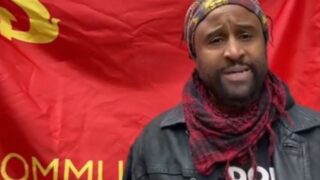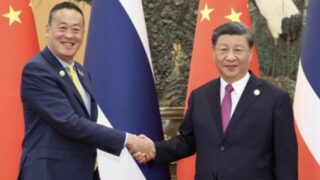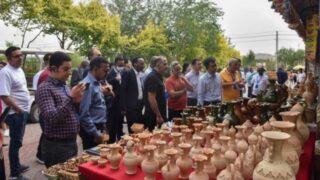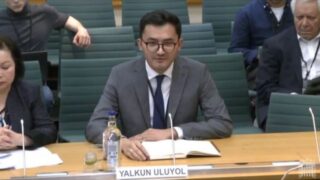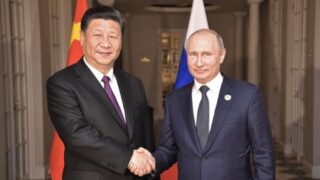What the Tiananmen massacre is for the Chinese people, the 2014 massacre of Elishku is for the Uyghurs.
by Abdurehim Geni Uyghur


July 28 is a terrible and nightmarish day in modern Uyghur history. On this date, July 28, 2014, Uyghurs were the victims of the Yarkant Massacre. The Chinese carried out a planned, organized, deliberate, systematic and inhuman mass state-terror massacre against Uyghurs in the villages of Elishku town and Hangdi town in Yarkant (Yekan) County of East Turkestan (Ch. Xinjiang).
Yarkant was the capital city of the Yarkant Khanate, once a mighty and powerful empire in Uyghur history. The Khanate (1514–1694) was highly developed politically, economically, culturally, militarily, and educationally, and its history is a colorful and interesting subject.
Just like history is replete with successes and failures, and colorful and fascinating times alternate with miracles and tragedies, Yarkant had its share of joys and sorrows.
July 28, 2014, was in the last days of Ramadan. Since many Uyghur Muslims pray without sleeping at night on such special holy days, on this occasion more than forty women gathered in the village of Elishku town in Yarkant County to worship and end the month of Ramadan in prayer.
The armed police forces of the Chinese government had prior knowledge of this gathering, as it was no secret, in fact a religious event. They allowed it to take place and progress, while they secretly watched and amassed an assault force. The authorities were willing to let it happen so to set up and achieve the maximum effect of their evil goal of terror and suppression.


“Go in and completely wipe out these women and any resistance.” This was the personal statement of a Dongbagh police station officer, preserved in Habibullah Izchi’s Bluestone Archive.
The Chinese forces, consisting of armed police and military soldiers, completely surrounded the house where the women had gathered. They confined and terrorized them. They assaulted them removing their headscarves and long dresses, and ridiculed their reading of the Mevlut Prayer. The husbands and other relatives of the women strongly reacted to this action of force against their wives and mothers, which quickly led to the use of deadly force by the troops. Others slowly gathered and spontaneously formed a protest against the abduction of the women by the Chinese forces.
After the initial massacre, the families of the martyrs went to the Elishku town police station with their loved ones’ bodies to demand an answer according to Chinese law. The police response was to fire against the protesters in broad daylight. The villagers did not tolerate this injustice and atrocity, and protested in the marketplace to express their anger.
The Chinese government, seeing this protest as a provocation, initiated an unconscionable show of force to terrorize the villagers. They deployed tanks, armored personnel carriers, helicopters and drones in the sky, and the military and armed police. They conducted a general bloody suppression and massacre in several villages: Elishku town, Hangdi town, Dongbagh town, Kosh’erik town, and other villages. According to secondary data, the Chinese government massacred at least 5,000 Uyghurs and arrested tens of thousands more.
Later, the Chinese government reported that only 96 Uyghur had been killed and about 250 had been arrested. In fact, these numbers were fabricated to deceive the international community. And unknown is the number of the Uyghurs who survived the massacre but were arrested and killed in the prisons, or sentenced to indefinite or long years of imprisonment, or just disappeared.
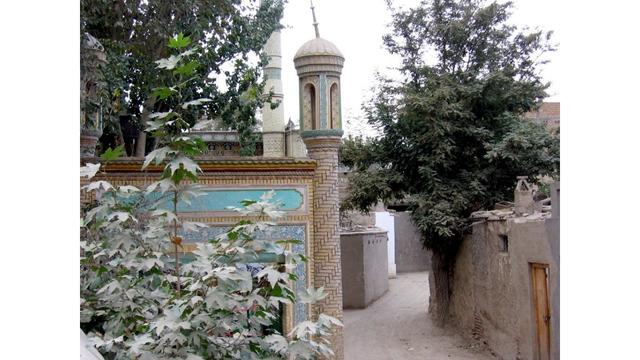

All the villages where protests erupted were completely evacuated, and it took nearly a week to dispose of the bodies of the martyrs. The real provocation was the Chinese government’ announce reducing the number of deaths and orphans to less than a hundred. This was intentional disinformation for political purposes, and evidence that the Chinese government lies to cover up their crimes; it is one of the so-called “36 tricks.”
Another disgusting act of the Chinese government in the Yarkant Massacre was that, despite the huge bloodshed and incalculable costs paid by the Muslim Uyghurs, it used its media to portray the Uyghur citizens as violent terrorists and religious extremists. This lie was sold to the Chinese public opinion and the international community. Since the end of that year, 2014, the Chinese government has used “terrorism” to justify the transformation through education camps, or any other label they attach to them, it built all over East Turkestan, paving the way for the genocide that continues to this day.


On July 28, 2016, Germany’s “Organization for the Protection of Endangered Nationalities” released a report titled “Two Years of the Yarkant Holocaust,” and compared the June 4, 1989, Tiananmen Square massacre in Beijing to the “Elishku massacre” of July 28, 2014.. The report said: “What the Tiananmen incident is for Chinese people, the massacre of Elishku is for the Uyghurs.”
The countries of the world remained silent when the Yarkant massacre happened. Even now, they do not ask the Chinese government to account for the massacre. The Uyghur nation, which was never willing to kneel, will never forget the innocent brothers and sisters who were martyred in the massacre. The Uyghur people believe that the Chinese government will pay the price for its crimes and that justice will be done by punishing them one by one.
Undoubtedly, all people on the planet who have not lost their moral conscience, whose sense of truth and humanity have not died, will one day support the righteous cause of the Uyghurs. The Uyghur nation believes with absolute certainty that the Chinese state will one day fail or be overthrown, and the Uyghurs will regain their independence, just as the nations under their colonial rule gained independence after the colonialist and communist countries failed or were overthrown in the last century. As Muslim believers, we look at the 5th and 6th verses of Surah al-Inshirah, where Allah through the Holy Prophet repeats that after every difficulty there is an ease.
After the July 5, 2009, Urumqi Massacre, which was carried out by the Chinese government, the Yarkant Massacre was one of the most brutal massacres that Uyghurs have suffered. Therefore, the Uyghurs in the Diaspora will never forget this massacre and will not allow history to be forgotten or rewritten. They hold protests all over the world every year on July 28, which are evidence, fact and proof of the bloodshed and tyranny of the Chinese government.


